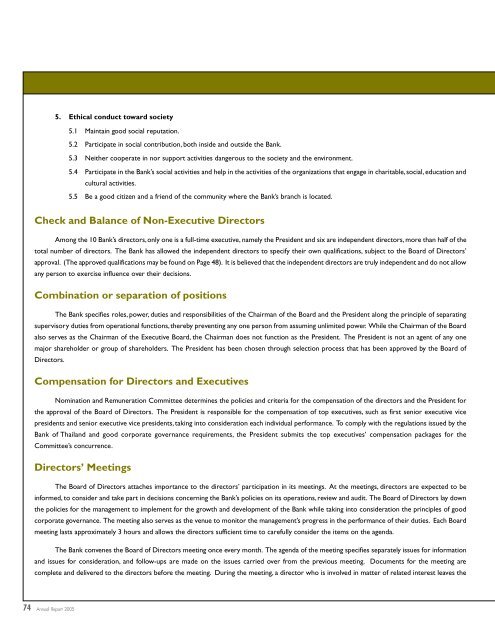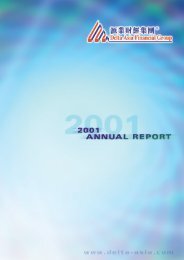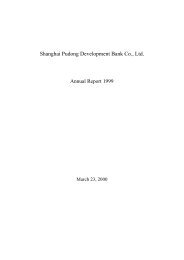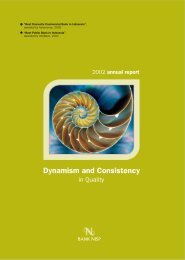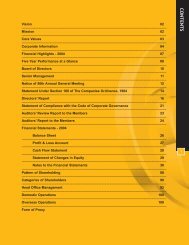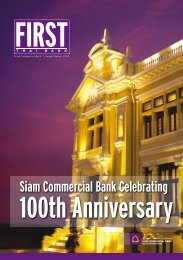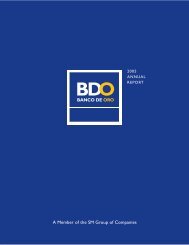2005 - Asianbanks.net
2005 - Asianbanks.net
2005 - Asianbanks.net
Create successful ePaper yourself
Turn your PDF publications into a flip-book with our unique Google optimized e-Paper software.
5. Ethical conduct toward society<br />
5.1 Maintain good social reputation.<br />
5.2 Participate in social contribution, both inside and outside the Bank.<br />
5.3 Neither cooperate in nor support activities dangerous to the society and the environment.<br />
5.4 Participate in the Bank’s social activities and help in the activities of the organizations that engage in charitable, social, education and<br />
cultural activities.<br />
5.5 Be a good citizen and a friend of the community where the Bank’s branch is located.<br />
Check and Balance of Non-Executive Directors<br />
Among the 10 Bank’s directors, only one is a full-time executive, namely the President and six are independent directors, more than half of the<br />
total number of directors. The Bank has allowed the independent directors to specify their own qualifications, subject to the Board of Directors’<br />
approval. (The approved qualifications may be found on Page 48). It is believed that the independent directors are truly independent and do not allow<br />
any person to exercise influence over their decisions.<br />
Combination or separation of positions<br />
The Bank specifies roles, power, duties and responsibilities of the Chairman of the Board and the President along the principle of separating<br />
supervisory duties from operational functions, thereby preventing any one person from assuming unlimited power. While the Chairman of the Board<br />
also serves as the Chairman of the Executive Board, the Chairman does not function as the President. The President is not an agent of any one<br />
major shareholder or group of shareholders. The President has been chosen through selection process that has been approved by the Board of<br />
Directors.<br />
Compensation for Directors and Executives<br />
Nomination and Remuneration Committee determines the policies and criteria for the compensation of the directors and the President for<br />
the approval of the Board of Directors. The President is responsible for the compensation of top executives, such as first senior executive vice<br />
presidents and senior executive vice presidents, taking into consideration each individual performance. To comply with the regulations issued by the<br />
Bank of Thailand and good corporate governance requirements, the President submits the top executives’ compensation packages for the<br />
Committee’s concurrence.<br />
Directors’ Meetings<br />
The Board of Directors attaches importance to the directors’ participation in its meetings. At the meetings, directors are expected to be<br />
informed, to consider and take part in decisions concerning the Bank’s policies on its operations, review and audit. The Board of Directors lay down<br />
the policies for the management to implement for the growth and development of the Bank while taking into consideration the principles of good<br />
corporate governance. The meeting also serves as the venue to monitor the management’s progress in the performance of their duties. Each Board<br />
meeting lasts approximately 3 hours and allows the directors sufficient time to carefully consider the items on the agenda.<br />
The Bank convenes the Board of Directors meeting once every month. The agenda of the meeting specifies separately issues for information<br />
and issues for consideration, and follow-ups are made on the issues carried over from the previous meeting. Documents for the meeting are<br />
complete and delivered to the directors before the meeting. During the meeting, a director who is involved in matter of related interest leaves the<br />
74


